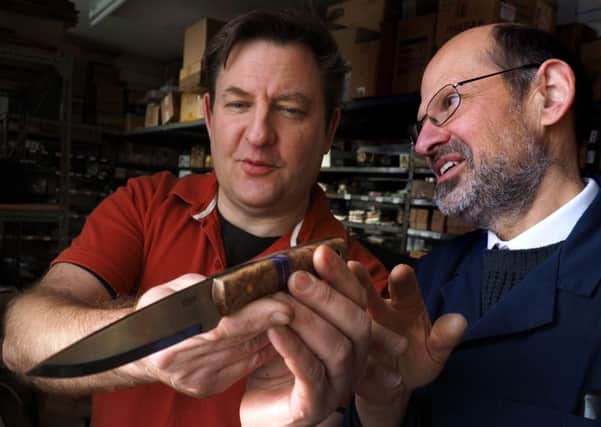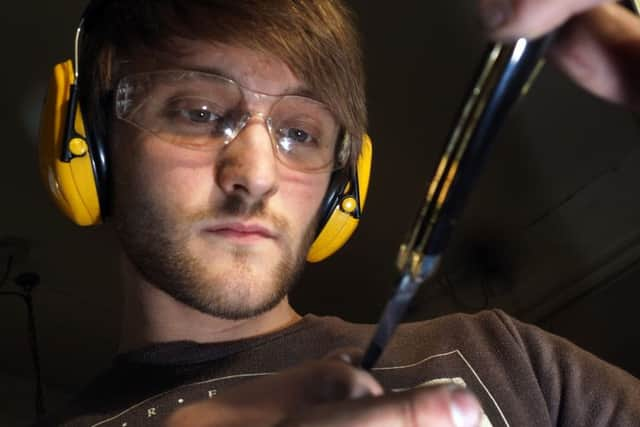Why quality counts when producing dashing blades in Sheffield


“Red deer urinate in puddles and then put the scent on trees with their antlers, so that’s where their horns get their colour.”
John Maleham is a descendant of the famous Victorian cutler and silversmiths Maleham and Yeomans, and after starting a toolmaking business at Abbeydale Industrial Hamlet over 20 years ago, John bought the Arthur Wright and Son name in the 1990s and moved Wright’s pocket knife business from Sidney Street into a city centre workshop set up in an old pub dating back to the 1790s.


Advertisement
Hide AdAdvertisement
Hide AdAnd now, yards away from the city’s thriving ‘brand experience’ and ‘identity creation’ industries, a small and growing team of cutlers make tens of thousands of traditional horn or wood handled Arthur Wright and Son carving sets, hunting knives and pocket knives.
It is, said John, a growing industry, which is a surprise to many Sheffielders.
“People get the impression it’s a trade on its way out as the majority of knives you see on a shelf are from China and elsewhere. We are a small company producing a small number of knives, but it is growing.”
More people are choosing to spend their money on handmade items rather than something mass-produced, he said, and if they’re after a special knife, they will still think of Sheffield first and foremost.


Advertisement
Hide AdAdvertisement
Hide AdThe huge overseas knife makers are not interested in small-scale handmade production, so knife makers like Arthur Wright have carved out what John likes to call a niche market. That niche, over the years, has included the postmen and women of Trinidad and the royal families of the UK and Tonga.
Nowadays men and women of a certain age and income profile like a Sheffield knife for gardening, or occasional apple-peeling and string-cutting. “It is like male jewellery, in a way,” John said. “People like to have a nice knife in their pocket or drawer.”
Everyone used to carry around a pocket knife in Sheffield, he said, recalling a public information film of the 1940s depicting a boy in a borstal who owned a pocket knife to no-one’s alarm. John added that the law nowadays allows you to carry a folding knife with a blade under three inches as a tool - but only if you have good reason to do so. “So it would be OK to carry a pocket knife during the day because you might want to peel an apple, but you wouldn’t have a good reason to take one to a nightclub,” he explained.
The issue now is not lack of demand, but lack of trained workers, said John.
Advertisement
Hide AdAdvertisement
Hide AdHe added: “The job market has changed, and young people expect to go to university or a white collar job – they often don’t want to get their hands dirty.”
There are young people interested in manufacturing, but who ‘don’t have the paperwork behind them’, as John puts it. So he’s recently set on a number of young apprentices, and will soon be looking for more.
“It’s now become a very niche skill set, that only a relatively small number of people have any more,” said Ashley Harrison, one of two cutlers in their early 20s working at Arthur Wright. “When people ask what you do for a living quite a lot of people don’t think it’s an actual job anymore.”
In Ashley’s case, it was part of the family tradition: he’s the fourth generation of his family to work as a knife maker, in his case alongside dad Michael, now general manager at Arthur Wright.
Advertisement
Hide AdAdvertisement
Hide Ad“It’s important to encourage young people to take up not just these skills but any skill in any trade,” said Michael. “I feel it’s everybody’s duty to pass on skills taught to them, some of which are hundreds of years old, to the next generation. It saddens me to hear others say they don’t have the time to train anybody, because training becomes self-fulfilling as time goes on and leads to better productivity. Once these skills are lost, that’s it.”
Ashley and Michael carefully arranged a set of knives with wood and horn handles, now made with the whiter and less pithy antlers of Père David’s deer, a byproduct of the UK venison industry.
“It makes me feel as if I’m helping to keep a part of Sheffield’s history going,” said Ashley. “There is a future for Sheffield pocket knives and, as long as people get back into the industry, it’ll carry on.”